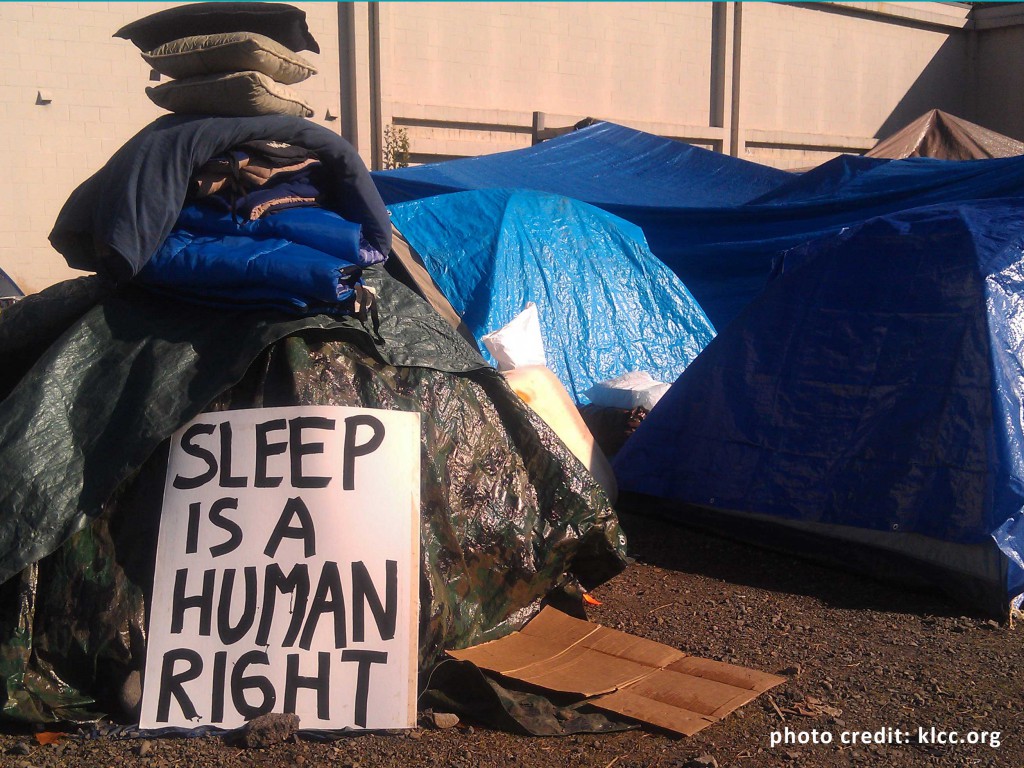My hope after graduate school is to work in a position where I have the power to listen to and empower communities whose voices have been silenced. Before coming to the University of Oregon, I spent time in Portland working with an Environmental Justice organization. After working in social justice at the grassroots level and facing opposition from agencies in power, I decided to get a Master of Community and Regional Planning.
Now, as a part of the Community Service Center’s Community Planning Workshop (CPW), I am working on a project that will give me the chance to share the voices of Eugene’s homeless community. My project involves evaluating Eugene’s current rest stop and microvillage program, and providing the city with ideas on how to better implement the program. When this project was proposed to us in the first week of class, I immediately knew it was my top choice; I believe that sleeping in a safe place is a vital human right and the large number of people who don’t have a safe, reliable place to sleep in our communities is a tragedy. After learning briefly about the state of homelessness in Eugene last term, I was excited to choose a CPW project I’m so passionate about!
The City of Eugene estimates that anywhere from 1500-3000 people in the community lack a safe and stable place to sleep at night, with many others at risk of becoming homeless. In April of 2014, the controversial and highly publicized removal of a homeless camp (called Whoville) from a vacant site near the University of Oregon campus led to increased community dialogue about how the City of Eugene is approaching local homelessness.
In 2013, City of Eugene started a Rest Stop Pilot Program which allows people without permanent homes to camp legally in sites managed by community organizations. Two of these rest stops are managed by Community Supported Shelters. At a third site provided by the city, a transitional micro-housing program called Opportunity Village allows 30-40 residents to live for longer periods of time. “Microvillages”, like Opportunity Village, offer residents their own housing in a safe, stable community where they can participate in employment training and often volunteer around the village in various ways.
The city would like to develop more long-term approaches to providing shelter through rest stops or microvillages. Through multiple conversations, the University of Oregon and the City of Eugene thought about how the University could contribute to issues within its own community. It was through these conversations the University asked the Community Service Center to evaluate the rest stop, and microvillage program. Specifically, our team is tasked with determining best practices from around the country, and providing recommendations on improving local housing services for the homeless.
The project will take around six months to complete. The first steps are to develop a better understanding of Eugene’s current programs, and study rest stop and microvillage programs in other places. After completing these initial steps, we will survey village residents, local service providers and other community members to evaluate the effectiveness of the current programs. At the end, we will provide the City of Eugene with a framework for the continued operation, and potential expansion, of microvillages in Eugene.
I am delighted to be working as part of such a motivated team, with members that hail from around the country and from different academic and professional backgrounds. Stay tuned as Brody Abbott, Henry Hearley, Nick Meltzer, Jaleel Reed, and I dig deeper into the topic of housing options and begin to study ground-breaking solutions from across the nation!
 About the Author: Emily Brown is a first year Master of Community and Regional Planning student originally from Walla Walla, Washington. Before moving to Eugene, she lived in Portland where she was involved in Environmental Justice activism and worked for a renewable energy company.
About the Author: Emily Brown is a first year Master of Community and Regional Planning student originally from Walla Walla, Washington. Before moving to Eugene, she lived in Portland where she was involved in Environmental Justice activism and worked for a renewable energy company.


Ms. Brown, my name is Rick and I have been categorized as chronically homeless. I’m not homeless at the moment, and I’m not in Eugene,..I’m in Twin Falls, Idaho along with my wife. I have a plan to help the homeless situation, but by myself nobody will listen. The plan consist of getting the Students that are taking classes to become therapist to take on a few homeless clients for extra credit in school. I know that for a therapist to receive their license they have to see clients as a licensed therapist is in the room watching over the case, but I wanted to find out what the chances are that we might talk Oregon government to change that ruling, or at the least use some of the money the city is using to take care of this problem to pay for some professional help. Please try to remember, the one thing all homeless people have in common is that they don’t feel accepted. If we can help them with this, we could make a break through on this problem. Right now, in many communities these people are shoved out of town before they even find a place to start looking for work, and other times employers won’t pay the legal minimum wage because the employer knows that this person has to take what ever is offered or go without. They have no lawyers to represent them unless the get in trouble, and then the only help is to spend time in jail or leave town. I know how to talk to the city and make them understand, but I will need someone in your community to help represent me. I will have more details when we actually converse for the first time, but until then remember, in most States homeless people have fewer rights then a prisoner at the State prison, because if they get accused of taking something, they still have a lawyer, three meals a day and a warm bed. If your in Fargo North Dakota and get accused in January,…you could get a death sentence. Thank you so very much for being there, but more then anything thank your parents for teaching you that having heart is the best thing .